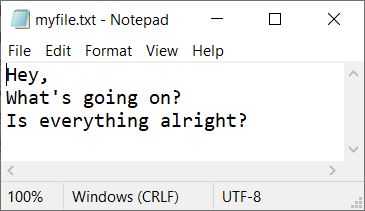- PHP Basics
- Learn PHP
- PHP Comments
- PHP Data Types
- PHP Variables
- PHP Operators
- PHP echo
- PHP print
- PHP echo vs. print
- PHP if else
- PHP switch
- PHP for Loop
- PHP while Loop
- PHP do...while Loop
- PHP foreach Loop
- PHP break and continue
- PHP exit()
- PHP exit() vs. break
- PHP isset()
- PHP Arrays
- PHP print_r()
- PHP unset()
- PHP Strings
- PHP Functions
- PHP File Handling
- PHP File Handling
- PHP Open File
- PHP Create a File
- PHP Write to File
- PHP Read File
- PHP feof()
- PHP fgetc()
- PHP fgets()
- PHP Close File
- PHP Delete File
- PHP Append to File
- PHP Copy File
- PHP file_get_contents()
- PHP file_put_contents()
- PHP file_exists()
- PHP filesize()
- PHP Rename File
- PHP fseek()
- PHP ftell()
- PHP rewind()
- PHP disk_free_space()
- PHP disk_total_space()
- PHP Create Directory
- PHP Remove Directory
- PHP Get Files/Directories
- PHP Get filename
- PHP Get Path
- PHP filemtime()
- PHP file()
- PHP include()
- PHP require()
- PHP include() vs. require()
- PHP mysqli Tutorial
- PHP mysqli Tutorial
- PHP and MySQL Setup
- PHP mysqli: Create Database
- PHP mysqli: Create Table
- PHP mysqli: Insert Record
- PHP mysqli: Update Record
- PHP mysqli: Fetch Record
- PHP mysqli: Delete Record
- PHP mysqli: SignUp Page
- PHP mysqli: LogIn Page
- PHP mysqli: Store User Data
- PHP mysqli Functions
- PHP mysqli_connect()
- PHP mysqli_close()
- PHP mysqli_connect_errno()
- PHP mysqli_connect_error()
- PHP mysqli_query()
- PHP mysqli_fetch_row()
- PHP mysqli_fetch_assoc()
- PHP mysqli_fetch_array()
- PHP mysqli_free_result()
- PHP mysqli_error()
- PHP mysqli_prepare()
- PHP mysqli_stmt_bind_param()
- PHP mysqli_stmt_execute()
- PHP mysqli_stmt_fetch()
- PHP mysqli_stmt_store_result()
- PHP mysqli_stmt_num_rows()
- PHP mysqli_stmt_bind_result()
- PHP mysqli_stmt_get_result()
- PHP mysqli_result class
- PHP mysqli_report()
- PHP error_reporting()
- PHP mysqli_real_escape_string()
- PHP htmlspecialchars()
- PHP Misc Topics
- PHP Object Oriented
- PHP new Keyword
- PHP header()
- PHP getallheaders()
- PHP Cookies
- PHP Sessions
- PHP Date and Time
- PHP GET vs. POST
- PHP File Upload
- PHP Image Processing
PHP fwrite(): Write to a File
The PHP fwrite() function is used when we need to write some content to a file. For example:
<?php
$fp = fopen("myfile.txt", "w");
fwrite($fp, "PHP is Fun!");
fclose($fp);
?>
After executing the above PHP code, the content/text PHP is Fun! will get written in the file named myfile.txt.
Note: To write some text to a file, the file must be opened in w (writing) mode, using the function named fopen().
PHP fwrite() Syntax
The syntax of the fwrite() function in PHP is:
fwrite(filePointer, text, length)
The first two parameters (filePointer and text) are required, but the last one (length) is not (optional).
Note: The filePointer parameter specifies the pointer to the file.
Note: The text parameter is the content or text that has to be written in the file.
Note: The length parameter is used when we need to define the maximum number of bytes to write.
The fwrite() function returns the number of bytes (characters) written to the file. For example:
<?php
$fp = fopen("myfile.txt", "w");
if($fp)
{
echo fwrite($fp, "PHP is Fun! Isn't it?");
fclose($fp);
}
else
echo "<p>Unable to open the file</p>";
?>
Since the text PHP is Fun! Isn't it? is of 21 characters, therefore the output of the above PHP example on the fwrite() function should be:

PHP Write to File Line by Line using fwrite()
To write content to a file line by line using the PHP fwrite() function, use PHP_EOL as shown in the example given below:
<?php
$fp = fopen("myfile.txt", "w");
if($fp)
{
$line = "Hey,";
fwrite($fp, $line.PHP_EOL);
$line = "What's going on?";
fwrite($fp, $line.PHP_EOL);
$line = "Is everything alright?";
fwrite($fp, $line.PHP_EOL);
fclose($fp);
}
else
echo "<p>Unable to open the file</p>";
?>
The three texts will be written line by line. Therefore, after executing the above PHP example, here is the snapshot of the file myfile.txt.

« Previous Tutorial Next Tutorial »